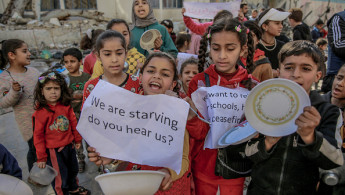WHO says 8,000 under-5s treated for malnutrition in Gaza
More than 8,000 children aged under five have been treated in the Gaza Strip for acute malnutrition since war broke out, the World Health Organization said on Wednesday.
WHO chief Tedros Adhanom Ghebreyesus said 28 of those children had died and a significant proportion of Gaza's population was now facing catastrophic hunger and famine-like conditions.
"Despite reports of increased delivery of food, there is currently no evidence that those who need it most are receiving sufficient quantity and quality of food," he told a press conference.
Tedros said the UN health agency and its partners had attempted to scale up nutrition services in the besieged Palestinian territory.
"Over 8,000 children under five years old have been diagnosed and treated for acute malnutrition," he said.
Among them, he said 1,600 were suffering from severe acute malnutrition, also known as severe wasting -- the most deadly form of malnutrition.
However, due to insecurity and lack of access, only two stabilisation centres for severely malnourished patients can currently operate, Tedros added.
"Our inability to provide health services safely, combined with the lack of clean water and sanitation, significantly increases the risk of malnourished children," he said.
"There have already been 32 deaths attributed to malnutrition, including 28 among children under five years old."
The war broke out after Hamas's October 7 attack resulted in the deaths of 1,194 people, mostly civilians, according to an AFP tally based on Israeli official figures.
The Israeli army launched a devastating offensive on Gaza that has left more than 37,000 people dead, the majority of them civilians, according to the territory's health ministry.
Tedros said there was also an escalating health crisis in the West Bank, with attacks on healthcare, and movement restrictions, obstructing access to health services.
He said that since the Gaza war started, the WHO had documented 480 attacks on healthcare facilities and personnel in the West Bank, resulting in 16 deaths and 95 injuries in the Palestinian territory.
The WHO's surveillance system for attacks on healthcare does not attribute responsibility.
"In the West Bank, as in Gaza, the only solution is peace," said Tedros.
"The best medicine is peace."





 Follow the Middle East's top stories in English at The New Arab on Google News
Follow the Middle East's top stories in English at The New Arab on Google News


